|
|
|
Sort Order |
|
|
|
Items / Page
|
|
|
|
|
|
|
| Srl | Item |
| 1 |
ID:
058437
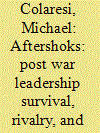

|
|
|
| 2 |
ID:
077295


|
|
|
|
|
| Publication |
2007.
|
| Summary/Abstract |
In this article I investigate the apparent tension between liberal theories that highlight the foreign policy benefits of domestic accountability and the observation that the public tends to reflexively support a leader during an international crisis. Previous theories of the process by which the public rallies around their leader tend to highlight the emotional and automatic nature of citizens' responses to threats. Using a simple signaling model, I show that the political and operational circumstances that increase the probability of post hoc verification and punishment for privately motivated policy enhance the credibility of a leader's choices and transmit information on the benefits of action to the public. I derive several observable hypotheses from the informational model, linking the costliness of the signal, the presences of divided government, election years, active term limits, political insecurity, changes in freedom of information laws, and trust in government to the size of the rally in the United States. A battery of empirical tests offer strong support for the informational model and suggest that a public rally is a rational response to numerous international crisis circumstances. Observing a rally need not imply an emotional or irrational public
|
|
|
|
|
|
|
|
|
|
|
|
|
|
|
|
| 3 |
ID:
152298
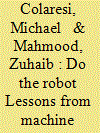

|
|
|
|
|
| Summary/Abstract |
Increasingly, scholars interested in understanding conflict processes have turned to evaluating out-of-sample forecasts to judge and compare the usefulness of their models. Research in this vein has made significant progress in identifying and avoiding the problem of overfitting sample data. Yet there has been less research providing strategies and tools to practically improve the out-of-sample performance of existing models and connect forecasting improvement to the goal of theory development in conflict studies. In this article, we fill this void by building on lessons from machine learning research. We highlight a set of iterative tasks, which David Blei terms ‘Box’s loop’, that can be summarized as build, compute, critique, and think. While the initial steps of Box’s loop will be familiar to researchers, the underutilized process of model criticism allows researchers to iteratively learn more useful representations of the data generation process from the discrepancies between the trained model and held-out data. To benefit from iterative model criticism, we advise researchers not only to split their available data into separate training and test sets, but also sample from their training data to allow for iterative model development, as is common in machine learning applications. Since practical tools for model criticism in particular are underdeveloped, we also provide software for new visualizations that build upon already existing tools. We use models of civil war onset to provide an illustration of how our machine learning-inspired research design can simultaneously improve out-of-sample forecasting performance and identify useful theoretical contributions. We believe these research strategies can complement existing designs to accelerate innovations across conflict processes.
|
|
|
|
|
|
|
|
|
|
|
|
|
|
|
|
| 4 |
ID:
082403
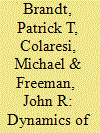

|
|
|
|
|
| Publication |
2008.
|
| Summary/Abstract |
Do public opinion dynamics play an important role in understanding conflict trajectories between democratic governments and other rival groups? The authors interpret several theories of opinion dynamics as competing clusters of contemporaneous causal links connoting reciprocity, accountability, and credibility. They translate these clusters into four distinct Bayesian structural time series models fit to events data from the Israeli-Palestinian conflict with variables for U.S. intervention and Jewish public opinion about prospects for peace. A credibility model, allowing Jewish public opinion to influence U.S., Palestinian, and Israeli behavior within a given month, fits best. More pacific Israeli opinion leads to more immediate Palestinian hostility toward Israelis. This response's direction suggests a negative feedback mechanism in which low-level conflict is maintained and momentum toward either all-out war or dramatic peace is slowed. In addition, a forecasting model including Jewish public opinion is shown to forecast ex ante better than a model without this variable
|
|
|
|
|
|
|
|
|
|
|
|
|
|
|
|
| 5 |
ID:
174462
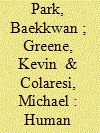

|
|
|
|
|
| Summary/Abstract |
This manuscript helps to resolve the ongoing debate concerning the effect of information communication technology on human rights monitoring. We reconceptualize human rights as a taxonomy of nested rights that are judged in textual reports and argue that the increasing density of available information should manifest in deeper taxonomies of human rights. With a new automated system, using supervised learning algorithms, we are able to extract the implicit taxonomies of rights that were judged in texts by the US State Department, Amnesty International, and Human Rights Watch over time. Our analysis provides new, clear evidence of change in the structure of these taxonomies as well as in the attention to specific rights and the sharpness of distinctions between rights. Our findings bridge the natural language processing and human rights communities and allow a deeper understanding of how changes in technology have affected the recording of human rights over time.
|
|
|
|
|
|
|
|
|
|
|
|
|
|
|
|
| 6 |
ID:
149105


|
|
|
|
|
| Summary/Abstract |
Despite 20 years of progress in promoting replication standards in International Relations (IR), significant problems remain in both the provision of data and the incentives to replicate published research. While replicable research is a public good, there appear to be private incentives for researchers to follow socially suboptimal research strategies. The current situation has led to a growing concern in IR, as well as across the social sciences, that published research findings may not represent accurate appraisals of the evidence on particular research questions. In this article, I discuss the role of private information in the publication process and review the incentives for producing replicable and nonreplicable research. A small, but potentially important, change in a journal’s workflow could both deter the publication of nonreplicable work and lower the costs for researchers to build and expand upon existing published research. The suggestion, termed Preplication, is for journals to run the replication data and code for conditionally accepted articles before publication, just as journals routinely check for compliance with style guides. This change could be implemented alongside other revisions to journal policies around the discipline. In fact, Preplication is already in use at several journals, and I provide an update as to how the process has worked at International Interactions.
|
|
|
|
|
|
|
|
|
|
|
|
|
|
|
|
| 7 |
ID:
131003
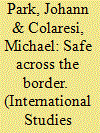

|
|
|
|
|
| Publication |
2014.
|
| Summary/Abstract |
We investigate the research findings reported in Gibler (2007) that suggest the democratic peace is in fact a spurious artifact of stable borders. If corroborated, this set of findings would mark an important reorientation for the field. However, we show that the research design used in Gibler (2007) suffers from several problems, including omitting the lower order terms of interaction variables and inappropriately assuming cross-dyad independence of artificially created dyadic democracy scores. Our replication and extension shows that even when controlling for stable border variables, democracy continues to be a consistently useful predictor of international conflict. Further, the stable border variables themselves prove to be less consistent predictors of both peace and democracy as compared to previous research. These results suggest that both territorial issues and democracy can coexist as explanations for interstate bellicosity.
|
|
|
|
|
|
|
|
|
|
|
|
|
|
|
|
| 8 |
ID:
065805
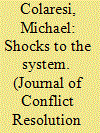

|
|
|
| 9 |
ID:
080821
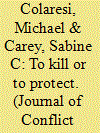

|
|
|
|
|
| Publication |
2008.
|
| Summary/Abstract |
Contemporary studies of genocide have found military capabilities to be inconsistent predictors of state-sponsored killings. We suggest that these empirical inconsistencies stem from the fact that government strength can serve two opposing purposes. Some level of armed capabilities is necessary for a state to remain viable and to provide internal and external security. Yet armed government personnel can be deployed to repress and destroy segments of the public. We identify conditions under which an executive is more likely to use security forces for private-interest killing rather than public protection. We hypothesize that unconstrained leaders are more likely to use their putative security forces to initiate genocide and remain in power. An analysis of state failures that lead to genocide robustly supports the idea that the effect of increased security forces on the risk of genocide is conditional on institutional executive constraints
|
|
|
|
|
|
|
|
|
|
|
|
|
|
|
|
| 10 |
ID:
128857


|
|
|
|
|
| Publication |
2014.
|
| Summary/Abstract |
Previous research has uncovered only ambiguous evidence of the mechanisms that support or inhibit democratic trajectories in the aftermath of civil war. Here I suggest that one specific form of transnational aid during a civil war may have reverberating consequences after the fighting stops. Specifically, when a state emerges to control the executive after a conflict with the help of a previous interstate enemy, the leadership is vulnerable to political attacks on their patriotism and judgment. As such, open democracy becomes a less attractive option for these executives. I investigate this proposition using difference-in-difference matching estimation, as well as several alternative specifications. The findings strongly suggest the presence of disincentives to democratize for those executives that received help from external rivals. This research provides a new set of tools for identifying the causes and potential remedies to deficient democracy after civil wars.
|
|
|
|
|
|
|
|
|
|
|
|
|
|
|
|
|
|
|
|
|